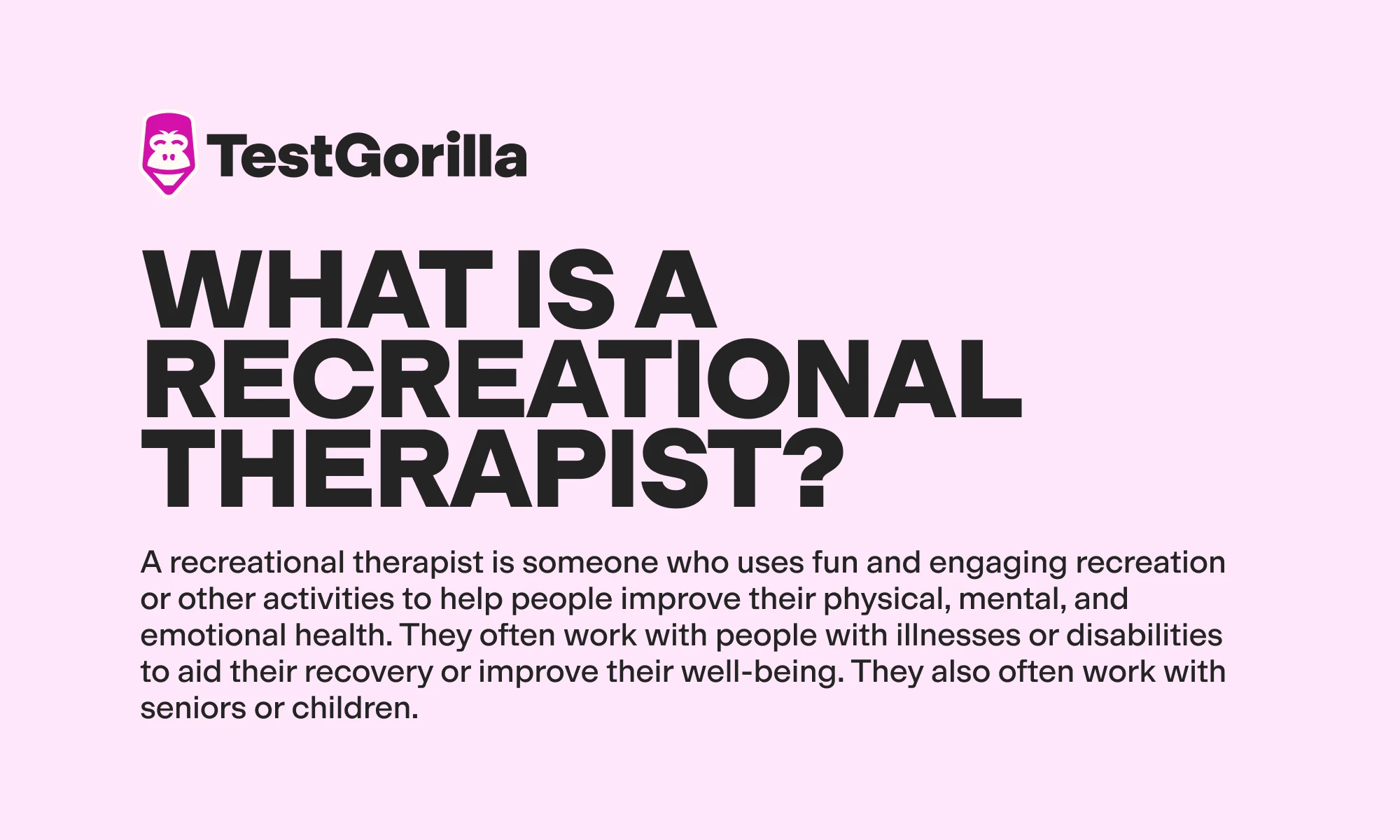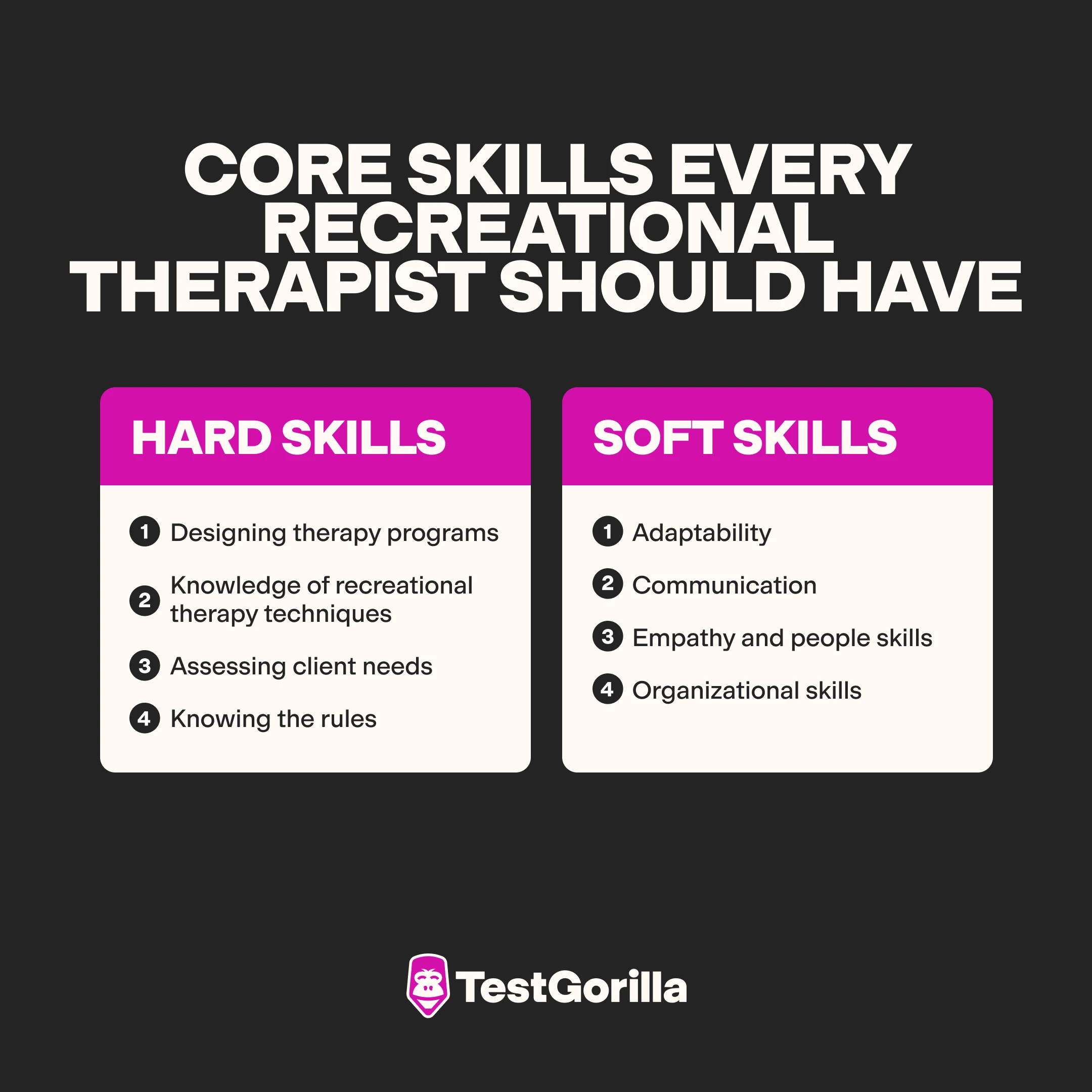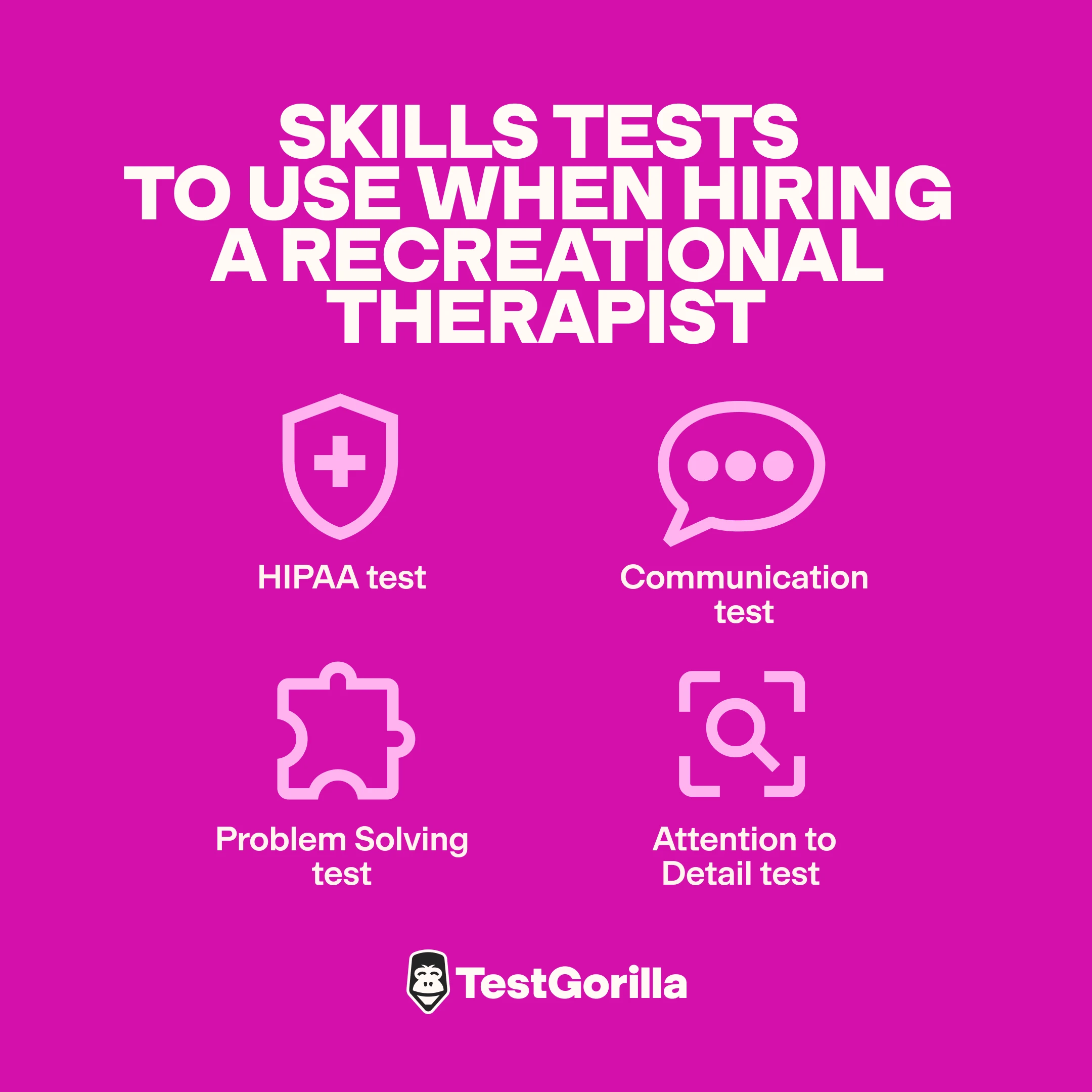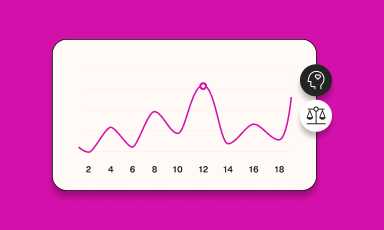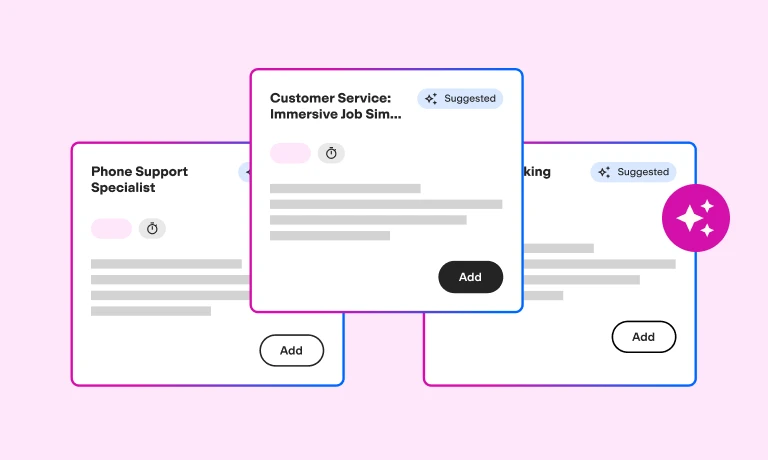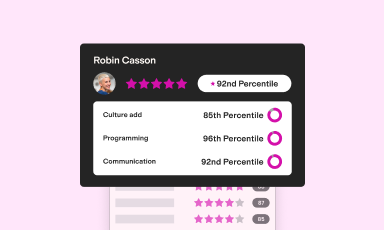Looking for a recreational therapist? You need someone who can come up with engaging, tailored programs that use fun and recreation to help clients with their recovery, well-being, and growth.
They should be good at juggling a busy schedule and tweaking their approach for different groups – all while staying current with the latest in therapy techniques.
The right recreational therapist can make a big difference by boosting client outcomes and satisfaction. But, if you make a bad hire, you might see less effective therapy, missed goals, and shaky communication – which can all set back your program.
We're here to help you nail the hiring process. Below, we guide you through finding a recreational therapist who can really make an impact.
Table of contents
- What is a recreational therapist?
- 7 key skills to look for in a recreational therapist
- Tips for writing a recreational therapist job description
- Where to find recreational therapist candidates
- How to test your future recreational therapist’s skills
- Top interview questions for a recreational therapist
- 2 mistakes to avoid when hiring recreational therapists
- FAQs
- Find top recreational therapists with TestGorilla
What is a recreational therapist?
A recreational therapist is someone who uses fun and engaging recreation or other activities to help people improve their physical, mental, and emotional health. They often work with people with illnesses or disabilities to aid their recovery or improve their well-being. They also often work with seniors or children.
Unlike physical therapists who might work full-time in a single facility, recreational therapists often spread their expertise across multiple settings. You might find them leading a group exercise at a senior center or working one-on-one with someone in a hospital.
They're constantly switching things up – making custom exercise routines for those with physical limitations, introducing calming music or art for stress relief, or planning social outings that encourage interaction and build community ties. For example, they might organize a painting session to help someone develop fine motor skills and relieve stress – or take a group of veterans to a community event to help them feel more connected.
These activities aren’t just picked to be enjoyable. They’re meant to help with specific health goals – which can be as simple as changing clients’ perspective about their identity and place in the world.
“One of the things we really want people to have in recreational therapy is a wellness-based identity,” says recreational therapy instructor, Brandon Snead. “Because a lot of people with illness and disabilities have an illness-based identity.” In other words – recreational therapists help clients see beyond their limitations and participate more fully in life-enhancing activities.
Recreational therapists are also pretty flexible with their schedules. They plan their day around what's best for their clients and make sure to coordinate with other healthcare professionals and family members. This way, everyone’s on the same page and understands why certain activities are important.
By tailoring their programs to fit each client's specific needs, they help improve lives in a very personal way.
7 key skills to look for in a recreational therapist
Keep an eye out for these key skills when searching for recreational therapist candidates.
Hard skills and expertise
Here are some important hard skills they should have.
Designing therapy programs: You want someone who can whip up various fun and effective therapy activities tailored to different needs. Whether they’re for kids, adults recovering from surgery, or seniors, the program designs should be spot-on.
Knowledge of recreational therapy techniques: It’s important that they really know their stuff when it comes to therapeutic methods – including the theory and the practical applications. Whether they’re using art, music, or sports, they should understand exactly how these activities can help meet therapy goals.
Assessing client needs: Good therapists are sharp at spotting what their clients need and tracking how well they're doing. They adjust activities based on what they observe, always aiming to keep things moving forward.
Knowing the rules: They should be clued up on all the important regulations, including those about patient confidentiality. This means keeping all personal and medical info private and secure.
Soft skills
Don’t overlook these key soft skills.
Adaptability: Treatment doesn’t always go as planned. You need someone who can think on their feet and tweak activities on the fly to keep sessions productive and engaging.
Communication: They need to be clear communicators – not just with clients but also with families and other healthcare providers. Explaining what they’re doing and why it helps clients is a big part of the job.
Empathy and people skills: Being able to connect with people and understand what they’re going through is key. This skill is about building trust and getting everyone involved and invested in the therapy process.
Organizational skills: Juggling multiple clients and sessions requires organization. Keeping everything running smoothly and on time is a must.
The best insights on HR and recruitment, delivered to your inbox.
Biweekly updates. No spam. Unsubscribe any time.
Tips for writing a recreational therapist job description
Once you know just what you should look for in your future recreational therapist, you must write a job description that attracts candidates with those exact skills. Here’s how to write great job descriptions for recreational therapist candidates.
1. Get specific about skills
Lay out the exact skills you’re looking for, like experience designing and leading therapeutic activities, expertise in adaptive sports, or knowledge in behavioral health. Being specific helps candidates quickly see if they match up with what you need.
2. Point out required certifications
Focus on the must-have certifications and qualifications, such as being certified by the National Council for Therapeutic Recreation Certification (NCTRC) or holding a degree in therapeutic recreation. This helps you draw in candidates who already meet your essential standards. Make sure you include any licenses they’ll need to practice in your state.
3. Detail the day-to-day
Give a clear picture of what the role involves on a daily basis – from planning activities to assessing client progress and working with other healthcare staff. Candidates appreciate knowing exactly what they’ll be doing and what’s expected of them.
4. Highlight the work environment and perks
Don’t forget to mention the kind of environment they’ll be working in – whether it’s varied like hospitals and community centers or outdoors. Also, throw in any perks – like opportunities for further training in specialized therapy techniques or the chance to work with diverse populations. Little details like these can make your job more appealing.
Keep it straightforward and honest, and you'll attract the right recreational therapists for your program.
Where to find recreational therapist candidates
Once you’ve got your job description written out, you’ll need to post it in places where strong candidates will see it. Here are some fresh ways to find qualified recreational therapist candidates.
1. Specialized job platforms
Platforms like HealthcareSource and Health eCareers are specifically for the healthcare industry.
Pros:
Gives you access to candidates specifically interested in healthcare roles
Makes it easier to find specialized skills like those needed for therapeutic recreation
Often has features for managing applications and communications
Cons:
These boards might have fewer users than larger, more general job boards
Posting on these boards and accessing their candidate databases might cost you money
2. University career services and training programs
Connecting with universities that offer degrees in therapeutic recreation or similar fields can provide a pipeline of fresh talent.
Pros:
You get access to new graduates who are trained and eager to start their careers
You get the opportunity to form partnerships for internships and co-op placements
Universities often help facilitate the connection process
Cons:
New graduates may require more training and time to acclimate
There might be limited candidates depending on graduation times
Building and maintaining strong relationships with educational institutions takes time
3. Social media and professional networks
Dipping into social networks – including LinkedIn and Facebook Groups – can help you find both active job seekers and passive candidates.
Pros:
Gives you a wide reach – including to candidates not actively searching job boards
Lets you see candidates’ professional networks and endorsements
Makes it easy to share listings through your network for increased visibility
Cons:
Job posts may attract lots of unqualified candidates
Sorting through profiles and verifying credentials is time-consuming
The level of engagement largely depends on your network’s activity and reach
How to test your future recreational therapist’s skills
It’s one thing to know the skills a recreational therapist should have, but it’s another to evaluate those skills effectively when hiring. But once you’ve drawn in applicants, that’s exactly what you must do.
Using a talent discovery platform like TestGorilla can help you quickly assess a candidate’s abilities, spot any gaps, and decide what to zero in on during interviews. You can mix up to five tests to create your own custom assessment for this niche therapeutic role.
Here’s a breakdown of the tests that can help you pick the right recreational therapist:
Our HIPAA test makes sure candidates understand healthcare data security to keep clients’ sensitive information safe and secure throughout treatment.
Our Communication Skills test assesses how well candidates can explain their thoughts and summarize messages. This is key for recreational therapists who need to explain therapy plans and goals in simple, clear terms.
The Problem Solving test checks whether candidates can create and adjust schedules, identify and solve problems, and organize tasks well. These problem-solving skills are crucial for recreational therapists because they often face unexpected client challenges and need to think quickly on their feet.
Our Attention to Detail test sees which candidates can filter information and use analytical skills to understand writing. This is important for recreational therapists because they often need to interpret detailed client assessments and medical histories to customize their therapeutic activities.
For a more in-depth assessment, add your own custom questions to these tests based on your unique needs.
And don’t forget to assess behavioral attributes like leadership, empathy, and judgment with personality tests. Our Enneagram, DISC, and 16 Personalities tests are great tools to get inside the minds of your recreational therapist candidates and learn about their personality traits, values, preferences, and more.
Top interview questions for a recreational therapist
In addition to assessments, you might also use interview questions to assess your candidates. Interviews are great for learning more about your top-scoring candidates’ skills – particularly the skills your assessment didn’t cover.
Here are some key interview questions to consider:
"Can you walk me through how you design a therapy program for a diverse group of clients?" This question explores the candidate’s approach to creating programs tailored to varying needs, highlighting their ability to plan and adjust activities based on specific client demographics and conditions.
"Describe a time when you had to adjust a therapy session on the fly. What was the situation and what did you do?" This gets at the candidate's ability to think quickly and make necessary changes during therapy sessions, which is crucial for dealing with unexpected challenges or client reactions.
"How do you assess and monitor the progress of your clients?" Asking this helps you understand their methods for determining how effective their therapeutic activities are and tracking client progress over time.
"Can you give an example of how you’ve used non-traditional therapy activities to engage clients?" This question helps you understand their creativity and willingness to incorporate new – and possibly unconventional – activities into their therapy programs, which can improve patient buy-in and outcomes.
2 mistakes to avoid when hiring recreational therapists
Here are two common pitfalls to watch out for when hiring recreational therapists.
1. Not checking for adaptability and creativity
Recreation therapy thrives on adaptability and creativity – after all, every client's response can be unpredictable.
For example, imagine a therapist has planned an outdoor team-building exercise for a group, but unexpectedly, one of the participants is having a tough day due to anxiety issues. A skilled therapist should be quick to adapt, perhaps by shifting the group’s focus to a calming mindfulness activity or organizing a simple, soothing craft that everyone can do together, keeping everyone feeling supported and engaged.
During interviews, ask candidates to explain times where they've had to think on their feet to change up activities on the fly.
2. Skipping over the importance of client connection
Recreational therapists should do more than just show up and lead activities – they need to really connect with their clients. This connection is what makes the therapy effective, as it helps therapists tailor their programs to what the clients actually need and enjoy.
When interviewing candidates, look for those who ask thoughtful questions about the clients they’ll be working with or who share stories about how they’ve built relationships in past roles.
Maybe a candidate will share how they learned a few words in another language to make a non-English speaking client feel more comfortable – or how they customized a music playlist to the tastes of a group of teens they were working with. These examples show a deep understanding of and commitment to their clients' well-being.
This might interest you: Check out our guide to hiring a physical therapist and our article on hiring an occupational therapist.
FAQs
Here are some common questions tied to the recreational therapist hiring process.
How much do recreational therapists earn?
According to Indeed’s 2024 data, recreational therapists make an average of $41.48/hour in the US, with the lower end making around $24/hour and the higher end making close to $72/hour.
Are there specific legal considerations when hiring a recreational therapist?
Make sure that candidates have the necessary licenses or certifications your state or country requires. Many US states require practitioners to hold licenses. Be aware of any legal requirements specific to working with vulnerable populations, which might include background checks.
Find top recreational therapists with TestGorilla
Recreational therapists are key in helping clients recover and improve their well-being through recreational activities. To hire the right person, you’ll want someone with solid experience, excellent communication skills, and a knack for personalized care.
But don’t just take resumes at face value. Instead, rely on assessments. TestGorilla can help. Our library of skills-based tests makes it easier to spot the best candidates who have the right skills and approach for your needs.
Ready to step up your hiring game? Sign up for a free TestGorilla account or book a demo today!
You've scrolled this far
Why not try TestGorilla for free, and see what happens when you put skills first.


